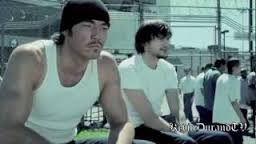The Butterfly Effect- (Prison Scene)
Props: paper with memories on it
Prison cell brightly lit
nonDiagetic sound of large heavy metal doors scrapping as they close and prison cell door in the background. Violins right before the action scene, turns into upbeat orchestra.
Diagetic sound is very secretive. Filled with questions. “Do you believe in that whole bit the lord works in mysterious ways?” (Evan to Carlos)
Costumes are prison outfits, Sweatpants and tee-shirts. Casualness is exaggerated in psychological thrillers. They are made to persuade the reader that the events unfolding can happen to them or anyone else in this world. Psychological thrillers tend to leave the viewer asking, “What if…”
This scene from the Butterfly Effect carries a numinous tone with its references to stigmata and divinity. The scene inaugurates when Evan Treborn, Ashton Kutcher, inquires the faith of his prison cell mate, Carlos, Kevin Durand. Carlos is baffled by Evan’s curiosity, but submits to his own whims of knowing when Evan insists on showing him something in private. In the well-lit prison cell Evan tells Carlos to watch for any signs of the Lord and begins to read a piece of paper containing his childhood memories. The suspense builds with non-diagetic audio and hazy camera effects until Evan in suspended in a lucid ubiquitous reminiscence of himself in his childhood classroom. He stabs himself in the hands with two sharp objects on his teacher’s desk and immediately wakes up from this memory with two newly formed scars on each palm. Carlos is convinced in Evan’s causality with the Lord, referring to Evan’s new scars as stigmata. Discovering this, Carlos agrees to help this mystical profit (Evan) retrieve his journal from rival gang leaders and escape from prison. The discussed scene is replete with a motif of Faith, something commonplace in many of our lives, which vouches for the practicality of the film and its genre.
This scene is not comprised of commendable acting from neither Kutcher nor Durand. The dialogue is generic and predictable. After Kutcher says “I think Jesus sent me to your cell for a reason.” all successive dialogue becomes negligible, and heed is given to the rising visual conflicts. The scene’s closing is captivating because it climaxes with Evan, Ashton Kutcher, vacillating between a safe-haven and an impending slaughter. This scene is not an archetypical psychological thriller movie extract due to the director aggrandizing action’s role, but it does
embody the wonder factor that a typical psychological thriller possesses.
